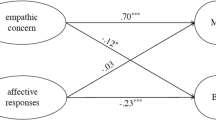Abstract
Individuals who disagree that organizational interests legitimately supersede those of the wider society may experience conflict between their personal standards of ethics and those demanded by an employing organization, a conflict that is well documented. An additional question is whether or not individuals capable of complex moral reasoning experience greater conflict than those reasoning at a less developed level. This question was first positioned in a theoretical framework and then investigated using 115 survey responses from a student sample. Correlational analysis and hierarchical regression indicated that individuals scoring high on the Defining Issues Test measure of Kohlberg's stages of moral development experienced significantly greater workplace ethical conflict than low scorers. The finding that complex moral reasoners perceive greater conflict between their personal standards and typical organizational demands raises the issue of what reasoning orientation is rewarded in organizations. Individuals capable of complex moral reasoning may be likely to leave traditional organizations due to high conflict but more ‘ethically friendly’ organizations for complex reasoners seem unlikely unless these people occupy influential positions.
Similar content being viewed by others
References
Davison, M. L.: 1979, ‘The Internal Structure and the Psychometric Properties of the Defining Issues Test’, in J. R. Rest (ed.), Development in Judging Moral Issues (University of Minnesota Press, Minneapolis), pp. 223–245.
Friedman, M.: 1970 (September 13), ‘A Friedman Doctrine: The Social Responsibility of Business is to Increase Its Profits’, New York Times Magazine 32–33, 122–126.
Donaldson, T. and L. E. Preston: 1995, ‘The Stakeholder Theory of the Corporation: Concepts, Evidence and Implications’, Academy of Management Review 20, 65–91.
Elm, D. R. and J. Weber: 1994, ‘Measuring Moral Judgment: The Moral Judgment Interview or the Defining Issues Test?’, Journal of Business Ethics 13, 341–355.
Froelich, K. S. and J. L. Kottke: 1991, ‘Measuring Individual Beliefs About Organizational Ethics’, Educational and Psychological Measurement 51, 377–383.
Graves S. B. and S. A. Waddock: 1994, ‘Institutional Owners and Corporate Social Performance’, Academy of Management Journal 37, 1034–1046.
Heiner, R. A.: 1983, ‘The Origin of Predictable Behavior’, American Economic Review 73, 560–594.
Jones, T. M.: 1995, ‘Instrumental Stakeholder Theory: A Synthesis of Ethics and Economics’, Academy of Management Review 20, 404–437.
Kohlberg, L.: 1976, ‘Moral Stages and Moralization: The Cognitive-Developmental Approach’, in T. Lickona (ed.), Moral Development and Behavior (Holt, Rinehart & Winston, New York), pp. 31–53.
Lee, T. W. and T. R. Mitchell: 1994, ‘An Alterative Approach: The Unfolding of Voluntary Employee Turnover’ Academy of Management Review 19, 51–89.
Mudrack, P. E. and E. S. Mason: 1996, ‘Individual Ethical Beliefs and Perceived Organizational Interests’ Journal of Business Ethics 15, 851–861.
Posner, B. Z. and W. H. Schmidt: 1985, ‘Ethics in American Companies: A Managerial Perspective’, Journal of Business Ethics 6, 383–391.
Quinn, D. P. and T. M. Jones: 1995, ‘An Agent Morality View of Business Policy’, Academy of Management Review 20, 22–42.
Rest, J. R.: 1979, Development in Judging Moral Issues (University of Minnesota Press, Minneapolis).
Rest, J. R.: 1994, ‘Background: Theory and Research’, in J. R. Rest and D. Narvaez (eds.), Moral Development in the Professions (Lawrence Erlbaum Associates, Inc.: New Jersey), pp. 1–26.
Teoh, H. Y. and G. Y. Shiu: 1990, ‘Attitudes Towards Corporate Social Responsibility and Perceived Importance of Social Responsibility Information Characteristics in a Decision Context’, Journal of Business Ethics 9, 71–77.
Walking, R. A. and M. S. Long: 1984, ‘Agency Theory, Managerial Welfare, and Takeover Bid Resistance’, Rand Journal of Economics 15, 54–68.
Weber, J.: 1990, ‘Managers' Moral Reasoning: Assessing Their Responses to Three Moral Dilemmas’, Human Relations 43, 687–702.
Author information
Authors and Affiliations
Rights and permissions
About this article
Cite this article
Mason, E.S., Mudrack, P.E. Do Complex Moral Reasoners Experience Greater Ethical Work Conflict?. Journal of Business Ethics 16, 1311–1318 (1997). https://doi.org/10.1023/A:1005706318791
Issue Date:
DOI: https://doi.org/10.1023/A:1005706318791




